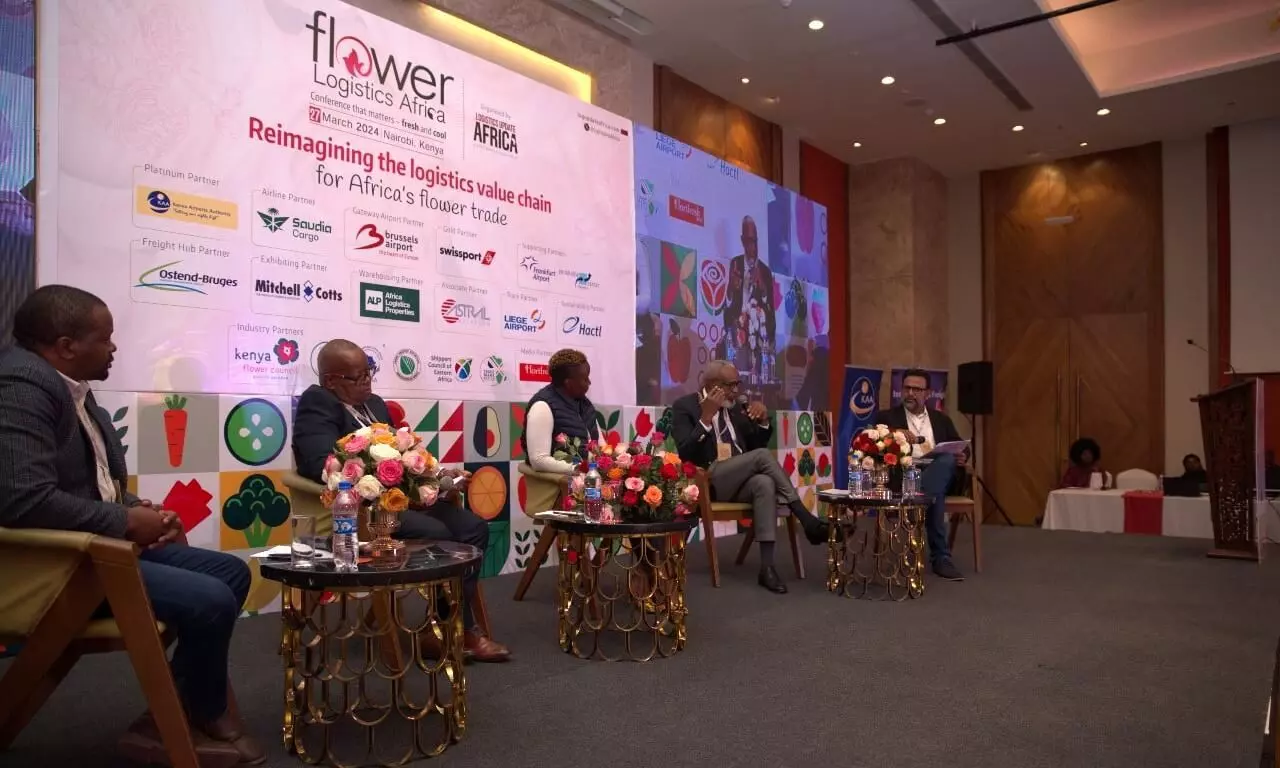
FLA Insights: Is sustainability pivotal in Africa's flower logistics?
At the event, Jacob Bwana from KAA highlighted the three pillars of sustainability: people, planet, and profit.

(L-R) Nick Mwaura of International Procurement & Logistics (IPL), Ken Mbogo of Saudia Cargo, Lina Jamwa of Kenya Flower Council (KFC), Jacob Bwana of Kenya Airports Authority and Reji John of Logistics Update Africa (moderator) during Panel 1 of Flower Logistics Africa 2024
Flower Logistics Africa (FLA) 2024, which was organised by Logistics Update Africa, provided a platform for industry stakeholders to delve into the intricacies of flower logistics and explore future trends that will shape the sector. The symposium was held on March 27 at Emara Ole-Sereni in Nairobi, Kenya, and brought together key players to discuss the challenges, innovations, and opportunities in the floriculture industry.
The opening remarks highlighted the importance of being prepared for unforeseen challenges, citing the Covid-19 pandemic as a prime example. It reaffirmed the industry's dedication to continuous improvement and excellence.
During the inaugural speech, Caleb Kositany, Chairperson of the Board of the Kenya Airports Authority, underscored Kenya's significant contribution to the global flower and logistics industry. Hailing from Eldoret, known for its conducive climate, Kositany extended an invitation for partnerships to leverage the region's potential for flower and perishable cultivation.
Caleb Kositany, Chairperson of the Board of the Kenya Airports Authority, delivering the inaugural address
During the keynote address, Lina Jamwa, Membership, Advocacy, and Communications Manager at Kenya Flower Council (KFC), shed light on Kenya's floriculture sector's vital role, stating, “Kenya’s Floriculture contributes 1% of the national GDP.”
She highlighted the key obstacles faced by Kenya's flower industry which include legislation such as tariffs and trade barriers, compliance with EU plant health regulations, sustainability concerns such as environmental and governance issues, cold chain management including packaging and post-harvest losses, the effects of climate change, logistical challenges such as high freight costs and the red sea crisis.
Adding on to the discussion, Jamwa said, “Because of the Red Sea crisis, we are now using the Cape of Good Hope, making our logistical expenses high. As a result, we are also facing other challenges like commodity shortage, higher transit times, higher freighter costs, port congestion, and inflation.”
During a presentation on the impact of the Red Sea crisis on logistical operations, Jamwa provided insights into the latest developments at Mombasa port. The port plans to shift 50% of its freight from air to sea by the year 2030. This move is aimed at reducing CO2 emissions and increasing efficiency through the integration of automation and technology.
In conclusion, Jamwa stated that the goal is to create a smoother logistics system, with sea freight overtaking air freight by 2030. The plan also involves making better use of technology, including blockchain, to enhance trade.
In the panel discussion on future trends in global flower supply chains, Ken Mbogo, Regional Director of Africa at Saudia Cargo, identified using sustainable aviation fuel and modernising aircraft as crucial trends.
Audience at Flower Logistics Africa 2024
He added “Upcoming trends in the market are - using more sustainable aviation fuel, modernising aircraft – we have a lot of old aircraft that we are modernising and focusing on growing e-freights. Modernisation of aircraft in not a cheap exercise but we have to maintain that agility to be relevant in the industry.” He also added, “Air freight is important but it will not replace sea freight. In fact, air freight will complement sea freights”
Adding on the point, Jacob Bwana, GM of Marketing and Business Development at Kenya Airports Authority, emphasised the importance of sustainability and community-building within the industry, stating, “Sustainability involves 3 Ps – the people, the planet, profit. We are looking to create communities where our stakeholders compete within themselves on a positive note.”
During the discussion, Nick Mwaura, the Direct Sourcing Manager at International Procurement & Logistics (IPL), and other panelists offered additional insights into the changing landscape of flower logistics, emphasising the importance of innovation and collaboration.
The conference had a renewed focus on advancing sustainability, efficiency, and resilience within Africa's flower logistics ecosystem. The symposium acted as a catalyst for dialogue, collaboration, and action, paving the way for a more robust and sustainable future for the floriculture industry in Africa. Various aspects were discussed during the conference to achieve this goal.

